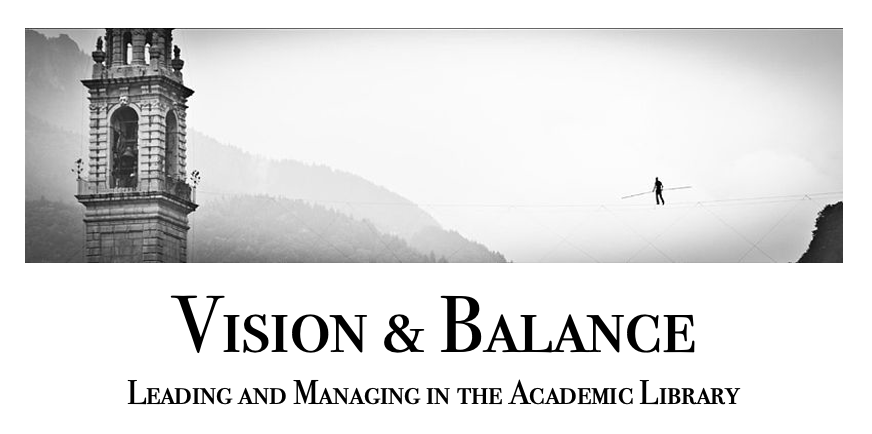In Part 1 of this series, we briefly discussed a simple visual matrix designed to help us stay focused on the boundaries that define both what’s practically feasible and what’s allowed in our organizations.
In Part 2, we compared management and leadership positions in the library to the meniscus in the human knee – a cartilaginous structure that is designed to accommodate pressure from above and pressure from below, by keeping the leg in alignment.
In this third and final installment in the series, we’ll talk a little more about the importance of alignment in library leadership, and why maintaining it is such an essential part of the library leader’s job – and what alignment has to do with political capital, the overarching theme of this series of articles.
A middle manager in a library needs to make sure that he keeps himself in alignment with his organization’s administration. Both understanding and advancing the library’s priorities is an essential part of any management assignment, whether the person in question is managing three student employees or a multidepartmental library division. If you chair a department, you both represent the library’s leadership to your team, and your team to the library’s leadership. And most of the time, this results in more-or-less constant (but minor) adjustments of perspective as you do your best to stand in the shoes of your staff when representing their needs and desires upward to administration and to do the same for the administration when representing their priorities and direction downward to your staff. The goal is to represent both parties, in both directions, accurately and in good faith.
But in any library, there will be moments when the administration insists on a direction or an initiative that the manager’s staff opposes, and when the discussion ends and the manager has to make a choice: undermine the administration’s decision, or convey to his staff that they are expected to carry out the initiative and will be held accountable for doing so.
In this moment, the manager has three choices:
1. Undermine the library’s leadership
2. Support the leadership and work to bring his staff along
3. Step down as a manager
Items #2 and #3 represent ethical options. Item #1 does not.
Why? Because accepting a salary to work for an institution creates an obligation to help the institution pursue its priorities and strategic directions – and (except in very unusual organizations) the manager’s role is to contribute to the shaping of those priorities and directions, but not ultimately to determine them. That responsibility rests with the library’s administration – which, itself, has an ethical obligation to do so as carefully and wisely as possible, taking into account the needs and desires and input of management and staff. But it’s very rare that those final decisions make all management and staff equally happy, and someone will almost always oppose them. If, after such a decision is made, a manager genuinely cannot in good conscience work to move the organization in the direction set by its administrators, then declining to continue as a manager is a perfectly ethical course of action (though of course one would hope that it doesn’t have to come to that). Deciding to stay in place and undermine the administration’s decision is not an ethical course of action, because it goes against one's express duties as a manager.
In other words: ultimately, for a manager, “alignment” means keeping one’s area of stewardship in alignment with the institution for which he works.
Obviously these same principles apply in the same way to library directors. They sit in a “meniscus” position between the library as a whole and the college or university administration to which they report; they advocate upward on behalf of their staff and their organization, and they advocate downward on behalf of the institutional administration. And ultimately, their ethical obligation is to keep the library aligned with the needs and strategic directions of the host institution. But this is important not only from an ethical standpoint, but also from a strategic one: the more clearly and consistently a library director demonstrates her alignment with institutional priorities, and shows that her library is working effectively to move the institution in the direction of those priorities, the more political capital she will amass on behalf of the library – political capital that can be spent later on behalf of the library’s needs and the needs of its staff.
I realize that some readers may be bristling a bit at my assertion that a leader’s job is to advance the larger institution’s priorities. What if the leader believes the institution’s priorities are misplaced, or improperly focused, or morally lacking? In that case, can it really be true that the leader’s only ethical obligation is to quit? I admit that this issue is maybe a bit more complex than I’ve indicated above. Let’s talk more about it in Thursday’s subscribers-only article: “What Is the Place of ‘Loyal Opposition’ in an Academic Organization?.”
Takeaways and Action Items
- An essential part of your job as a manager or leader is to advance (not undermine) the priorities of the organization for which you work.
- Conspicuously aligning your department, division, or library with the strategic directions of your organizational host will add to your "bank account" of political capital.
- Take a few moments to consider whether, in the past, you've found yourself in a position where you had to take a principled stand either against or in favor of an administrative direction. What principles guided you in taking that position? How did it work for you and your organization? In retrospect, is there anything you should have done differently?
Political Capital, Part 3: Alignment
Thoughts on the ethical dimensions of institutional alignment.
